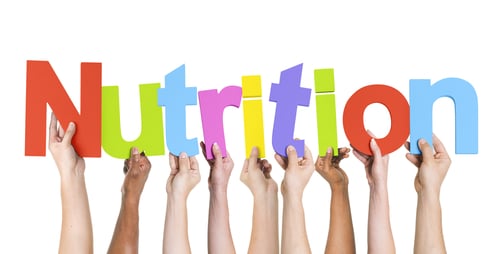
Did you know your nutritional needs change as you age? Not surprisingly, your calorie requirements go down as you lose lean body mass and your metabolism slows. This process accelerates after menopause. In fact, you lose muscle every decade after the age of 45. By age 50 you need around 400 fewer calories than you did in your twenties. Eating the same calorie-rich diet you did in your twenties will likely lead to unwanted weight gain.
Fortunately, resistance training helps preserve lean body mass. It also keeps your metabolism percolating along. Calorie requirement isn’t the only thing that changes with age. You may need more of certain nutrients, vitamins, and minerals to stay healthy.
Protein
Getting adequate dietary protein and resistance training are the keys to maintaining lean body mass as your body ages. You probably need more protein after 50 but the amount is still unclear. Until more is known, make sure you’re consuming a source of lean protein at every meal. Don’t forget protein can be plant based too.
Vitamin B12
Vitamin B12 is essential for energy metabolism, to maintain healthy red blood cells and preserve the myelin sheath that covers nerve cells. Myelin helps nerve impulses propagate faster. As a result, even marginal vitamin B12 deficiency can cause neurological symptoms like balance problems, numbness, and tingling decreased energy and brain fog. Even more disturbing is the fact these symptoms can progress to permanent neurological damage when they aren’t recognized and treated quickly enough.
Vitamin B12 deficiency is more common after the age of 50. The reason? As you age, you produce less stomach acid. Stomach acid is important for the absorption of vitamin B12. It takes several steps to absorb vitamin B12 – so there’s a lot of opportunities for things to go wrong. Vegans are also at risk for vitamin B12 deficiency since vitamin B12 is found naturally only in foods of animal origin. Some foods like cereal and milk are fortified with vitamin B12.
Once you reach the age of 50, check a vitamin B12 level every few years to make sure you’re in the normal range. If you’re a vegan, lower your risk by taking a vitamin B12 supplement.
Vitamin D
The average person gets most of their vitamin D from exposing their skin to sunlight. On the surface of your skin are chemicals that are converted to vitamin D precursors when you expose your skin to sunlight. These vitamin D precursors can be processed by your liver and kidneys to produce active vitamin D. With age, your skin loses some of the ability to convert these chemicals to vitamin D precursors. As a result, you need more sunlight exposure to get the same amount of active vitamin D.
Vitamin D is important for calcium absorption and may be important for immune health as well, based on preliminary research. Low levels of vitamin D can cause muscle aches, weakness, and fatigue. Vitamin D deficiency and borderline-low vitamin D levels are a relatively common problem in adults. That’s why it’s a good idea to check your vitamin D level periodically to make sure you don’t need a supplement.
Zinc
Zinc is a mineral you need in small quantities, but don’t assume it’s not important. Zinc is important for immune health wound healing and growth. Estimates are that 40% of older people aren’t getting enough zinc in their diet. Plus, zinc absorption declines with age. In animals, zinc deficiency is linked with inflammation. Considering inflammation is associated with a variety of chronic diseases including heart disease, type 2 diabetes and some forms of cancer, getting enough zinc is vital.
Zinc is also essential for protecting cells against oxidative stress and DNA damage. Vegetarians and vegans are also at greater risk for zinc deficiency since zinc is found in the greatest quantities in meat and seafood.
Zinc and copper strike a delicate balance. It’s important not to get high levels of zinc in your diet or take a zinc supplement unless you balance it with copper. Consuming large quantities of zinc can lead to a copper deficiency. Get your zinc naturally from food sources. If you’re vegetarian, beans, whole grain foods, and fortified cereals are good sources of zinc.
Beans and whole grains also contain compounds called phytates that can reduce the absorption of zinc. If you have digestive problems like inflammatory bowel disease, you’ll likely have problems absorbing zinc and may need a zinc/copper supplement – but talk to your doctor first.
Calcium
Calcium needs increase slightly with age. Women under the age of 50 need around 1,000 milligrams of calcium a day. Once you reach the age of 50, you should get 1,200 milligrams of calcium daily. You can meet these requirements by having three or more servings of dairy food each day. Other good sources of calcium are green, leafy vegetables, canned fish with bones, tofu, and calcium-fortified foods and beverages.
The Bottom Line?
As you age, your nutritional needs change. Over the age of 50, the risk for vitamin B12, vitamin D, and zinc deficiency increases. Plus, you need to get enough calcium in your diet, slightly more than during early adulthood. At the same time, calorie needs go down. That’s why it’s important to pick your foods wisely. Make sure the calories you’re getting are nutrient-rich ones and that you’re getting enough protein in your diet.
References:
Weight Watcher’s website. “Aging and Metabolism”
WebMD. “How Your Nutritional Needs Change as You Age”
Oregon State University. “Zinc deficiency mechanism linked to aging, multiple
diseases”
Nutraingredients-USA.com. “Study Shows Zinc Absorption Drops with Age, Linked
with Inflammation”
Am J Clin Nutr May 2005 vol. 81 no. 5 1240S-1245S
National Institutes of Health. “Zinc”
Am J Clin Nutr May 2008 vol. 87 no. 5 1562S-1566S.
Related Articles By Cathe:
Do You Need More of Certain Vitamins as You Age?
Can You Get All the Nutrients You Need from a Plant-Based Diet?

